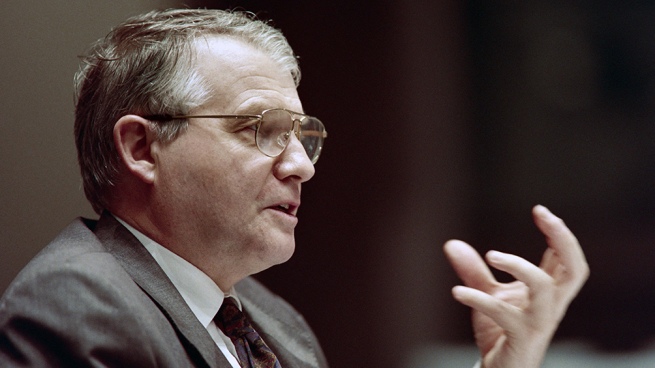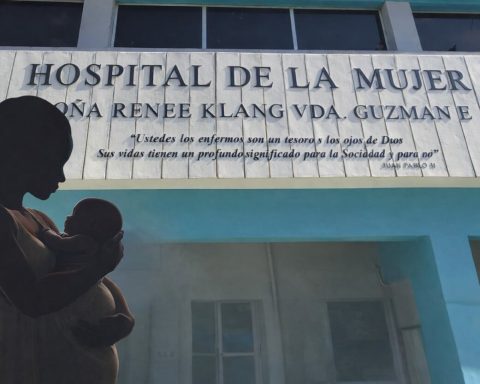the french scientist Luc Montagnier, Nobel Laureate in Medicine for their joint discovery of the HIV virus that causes AIDS, he died at the age of 89, the mayor of the Paris suburb where he was hospitalized announced Thursday.
Montagnier died Tuesday at the American Hospital in Neuilly-sur-Seine, said Mayor Jean-Christophe Fromantin, thus confirming a report published by the Francesoir newspaper.
Montagnier graduated in Medicine and Biological Sciences at the University of Paris.
He was born in Chabris, in central France, on August 18, 1932. He was the father of three children.
Within the Virology Department of the Pasteur Institute (Paris) founded the Viral Oncology Research Unit, laboratory dedicated to the study of most oncogenic retroviruses.
Between 1980 and 1984, Montagnier and his team at Pasteur isolated numerous human retroviruses from patients with sexual infections, hemophiliacs, mothers who had transmitted it to their children, and people infected in transfusions.
In 1983 they managed to isolate a virus that they initially called VAL (lymphadenopathy-associated virus), and which was later identified as the virus that causes AIDS and was called HIV (human immunodeficiency virus).
In 1983 Montagnier led the team that first isolated the human immunodeficiency virus (HIV 1), a new type of retrovirus not previously recognized in humans, and provided the first evidence that this virus was the causative agent of AIDS.
In 1985, the second AIDS virus, HIV 2, was also isolated from patients in West Africa.
In addition to his participation in the design of new types of vaccines against HIV, other studies by the scientist aimed at the diagnosis and treatment of microbial, viral, and epigenetic factors associated with cancer, neurodegenerative and joint diseases, using innovative technologies.
Montagnier He was a strong advocate of preventive medicine.especially concerned about the extension of the active life of elderly people.
He was awarded numerous prizes around the world, including the Nobel Prize in Physiology and Medicine in 2008, for his discovery of HIV, together with Francoise Barre-Sinoussi.
In 2013 he was in Argentina, where on April 19 he received the Honoris Causa Award from the National University of Cuyo “for his academic-scientific contribution and for his great contribution to humanity with the discovery, in 1983, of the AIDS virus.”
“There are treatments that are quite effective, but the virus has not been eradicated and there is a whole problem of access to medication for many patients,” he said at the time.
Finally, Montagnier spoke about research as a model to find cures for other diseases.
“I hope to see one day the complete eradication of the disease. And that this serves as a model to find the cure for other epidemics that have the same value of representation and it is the work of the institutions, such as the UNCuyo, that can carry out the advance scientist in search of a cure,” he said.
During another conference given at the National Academy of Medicine, in Buenos Aires, Montagnier remarked that medicine “has to be more preventive and predictive.”
Luc Montagnier is décédé.
On the loss of a man who did not have originality, independence and discoveries about RNA, he allowed the creation of a laboratory that isolated and identified the AIDS virus. (1/2)— Didier Raoult (@raoult_didier) February 10, 2022
AIDS, “30 years after the isolation of the virus, continues to be a health problem, in which there are several factors at play”he said, noting that although it is caused by HIV, “it can also be stimulated by infectious and non-infectious factors.”
The AIDS virus “has not been eliminated and what the different treatments do is prevent it from multiplying, allowing the patient’s life to be extended,” he added.
Then, on April 24, the City of Buenos Aires declared him Guest of Honor through its Legislature.
Montagnier participated, then, in the program ‘Homage to the Communities that built Argentina’, organized jointly by the Argentine Council for International Relations (CARI), the French Embassy and the OSDE Foundation, in recognition of all those who came to these lands and contributed to forming our Nation.
However, his aura has been tarnished in recent years after several statements that sparked enormous controversy and led him to be rejected by his colleagues.
The coronavirus and vaccines
Since 2017 made repeated statements against vaccines, and in the last two years he reappeared making claims about the coronavirus, responsible for the Covid-19 pandemic, which were refuted by the scientific community.
His statements about coronavirus vaccines led him to endear himself to the anti-vaccine movements.
In this regard, the infectologist Pedro Cahn considered that Montagnier “had two stages in his life”, referring to his recognized research and later to the promotion of “esoteric theories that distanced him from the scientific world”.
In dialogue with Télam, he explained that “in the first, he developed as the director of the Pasteur Institute, and in the second he began with esoteric theories that distanced him from the scientific world.”
“They are two completely different stages,” he said.
“All my appreciation for his first stage and a disappointment for what happened in the rest of his life,” concluded Cahn, who considered his death “regrettable.”

















